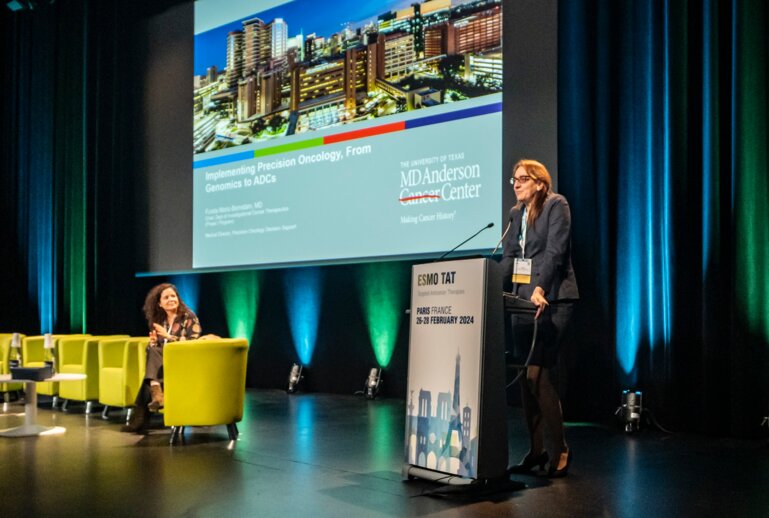The 2024 TAT Honorary Awardee Prof. Funda Meric-Bernstam discusses progress made and how to overcome current obstacles in the field
The past decade has witnessed considerable progress in precision oncology, both in technology and in drug development. In her lecture, ‘Implementing precision oncology: from genomics to ADCs’ at the ESMO Targeted Anticancer Therapies Congress 2024 (Paris, 26–28 February), 2024 TAT Honorary Awardee, Prof. Funda Meric-Bernstam looks at how these advances can be put to best use in clinical practice. Chair of the Department of Investigational Cancer Therapeutics – the Phase I Program, Medical Director of the Institute for Personalized Cancer Therapy and The Nellie B. Connally Chair in Breast Cancer at MD Anderson Cancer Center, Houston, Texas, US, Meric-Bernstam is being recognised for her significant contribution to translational research and involvement in the development of novel therapeutic approaches.
How far has precision oncology come over the last decade?
One of the major technological advances has been the capability to perform broader genomic testing in a timely fashion. While this type of testing was previously used only for investigational protocols, it is now more widely available for many patients with advanced disease. However, the area requires continuous review to make sure the added value of molecular testing is framed appropriately for each disease type. There has been regulatory approval of several therapies and biomarkers over the last ten years, but oncology researchers have also become humbled by the challenges that restrict the applicability of precision oncology, particularly the finding that actionable alterations are not present in all tumours and that, even when they are, there may be no, or only a short-term, response to targeted treatment, often due to adaptive or acquired resistance.
What do you consider to be your greatest achievements in this field to date?
Among the things I am most proud of is establishing the state-of-the-art Precision Oncology Decision Support Team at MD Anderson, which can provide point-of-care input for actionability. This was prompted by the awareness that while genomic testing was being frequently offered to patients, interpretation of the results and identification of treatment options was challenging. I think this team has contributed to the rapid patient accrual observed in many of the clinical trials the centre has been involved in. We now need to look into how this kind of infrastructure can be exported to enable more patients to be offered access to relevant clinical trials or appropriate approved agents.
For much of my career to date, I have worked on genomically informed therapies, including agents directed at FGFR and HER2. An area of precision oncology I am particularly excited about is antibody–drug conjugates (ADCs). I was involved in the DESTINY-PanTumor02 phase II trial, which showed the efficacy of trastuzumab deruxtecan in a pan-tumour fashion in HER2-expressing disease (J Clin Oncol. 2024;42:47–58). The demonstration that ADCs can have tumour agnostic activity if target expression is sufficiently high has implications for ADC development beyond HER2. There is also increasing activity around TROP2, which is expressed across a variety of tumours (Annu Rev Med. 2023;75:31–48). A major focus of research is to extend the benefits of ADCs to patients with rarer tumours and those with lower tumour-target expression. Areas being explored include improved identification of patients suitable for the different types of ADCs – involving comprehensive profiling, target expression and/or on payload sensitivity – and the most effective treatment combinations.
What are the challenges facing the wider implementation of precision oncology?
The main challenge is the considerable variability in patient access both to molecular testing and to approved and investigational agents. We need novel solutions to improve patient access to molecularly matched therapies and this may involve the construction of national and international networks, as well as a move to patient-centred clinical trial design that will help to minimise logistical obstacles.
Another challenge is that, while we have made a great deal of progress in genomics, we now need to exploit other approaches, such as profiling RNA, proteins and immune characteristics. Combining strategies will provide a more comprehensive understanding of an individual’s tumour and improve the tailoring of treatment options.
What are the most promising avenues of research at the moment?
Systematic study of logical approaches should help to broaden the reach of precision oncology and I think the focus has to be on rational combinations and identifying patients who will benefit most from the different strategies. In the US, the National Cancer Institute’s ComboMATCH trial (NCT05564377) is using genomic testing-directed combinations that have been shown to be superior to monotherapy in vivo. Preclinical modelling is a promising approach to indicate which combinations have value before they enter clinical testing. However, more data are required to determine the extent of in vivo activity that translates into clinical success, and this effort calls for extensive collaboration between international teams of basic and clinical investigators. Finally, I think that technological advances will see renewed investigation of next-generation tumour targets, such as KRAS, that were previously deemed difficult to tackle. This could be transformative, given that such targets often mediate resistance mechanisms or are the major drivers of tumours in large numbers of patients.
Don't miss:
Welcome and Honorary Award Session, 26.02.2024, h. 13:00 – 13:40, Amphitheatre Bordeaux
2024 TAT Honorary Award Keynote Lecture: Implementing precision oncology: from genomics to ADCs








